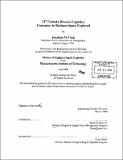21st century reverse logistics : consumer to business space explored
Author(s)
Fleck, Jonathan M. (Jonathan Michael), 1974-
DownloadFull printable version (2.592Mb)
Alternative title
Twenty-first century reverse logistics
Other Contributors
Massachusetts Institute of Technology. Engineering Systems Division.
Advisor
James B. Rice, Jr.
Terms of use
Metadata
Show full item recordAbstract
Despite a growing body of information about the importance of good logistics and supply chain management, there remains a dearth of research regarding consumer-to-business reverse logistics (the collection of processes required to move individual goods from individual end-consumers to the appropriate retailer, manufacturer, or third party). Indeed, there is not a comprehensive framework to assist enterprises in understanding, evaluating, creating, implementing, or changing a consumer-to-business reverse logistics policy of program. Given the growth of e-commerce and the Internet channel, where goods are often delivered to end-consumers in quantities of one and may likely be returned in quantities of one, this absence of a framework is peculiar. This thesis seeks to fill that gap by utilizing analysis of existing literature, as well as extrapolation of recent trends and developments in reverse logistics service offerings, technology, and last mile solutions. The results are that there is enough available information on the processes and issues surrounding consumer-to-business reverse logistics that a flexible and pragmatic framework can be proposed for use in the United States. This is accomplished by synthesizing results with original analysis, thought, and context. Though the framework cannot be considered comprehensive, it does provide an initial tool for critique and improvement.
Description
Thesis (M.Eng.)--Massachusetts Institute of Technology, Engineering Systems Division, 2000. Includes bibliographical references (leaves 58-64).
Date issued
2000Department
Massachusetts Institute of Technology. Engineering Systems DivisionPublisher
Massachusetts Institute of Technology
Keywords
Engineering Systems Division.